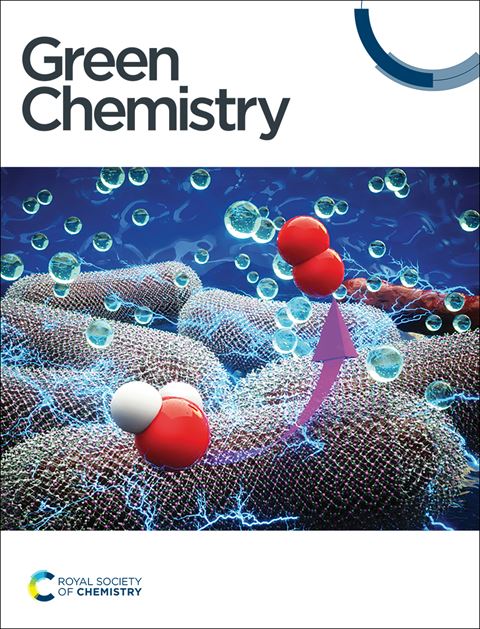无金属催化仲膦氧化物对伯醇的亲核取代作用†。
IF 9.2
1区 化学
Q1 CHEMISTRY, MULTIDISCIPLINARY
引用次数: 0
摘要
由于它们的惰性性质和低反应活性,在无金属条件下,MA反应的脱水版本尚未实现。本研究以三甲基碘硅烷(TMSI)为催化剂,开发了一种直接高效的伯醇与仲磷氧化物的无金属亲核取代反应,为合成有用的叔磷氧化物提供了一种简单、绿色的方法。这种方法是非常有效的,因为它可以扩展到各种伯醇,包括苯基和烯丙基,甚至更惰性的伯脂肪醇。在无柱色谱的条件下,通过简单的洗涤和/或再结晶,许多产品可以获得高纯度。这种方法也可以很容易地扩大规模,并应用于一锅逐步转化,以合成有用的化学品。机理研究表明,该反应可视为Michaelis-Arbuzov反应的脱水版本,醇脱羟基和脱氢过程可能都参与了该反应。本文章由计算机程序翻译,如有差异,请以英文原文为准。

Metal-free catalytic nucleophilic substitution of primary alcohols with secondary phosphine oxides†
Due to their inert nature and low reactivities, the dehydrative version of the MA reaction has not been achieved under metal-free conditions. Here, we develop a direct and efficient metal-free nucleophilic substitution reaction of primary alcohols with secondary phosphine oxides using trimethyliodosilane (TMSI) as the catalyst, providing a simple and green method for synthesis of useful tertiary phosphine oxides. This method is very effective as it can be extended to various primary alcohols, including benzylic and allylic, and even the more inert primary aliphatic alcohols. Many products can be obtained with high purity by simple washing and/or recrystallization under column chromatography-free conditions. This method can also be scaled up easily and applied in one-pot step-wise transformations to synthesize useful chemicals. Mechanism studies suggested that the reaction can be considered as a dehydrative version of the Michaelis–Arbuzov reaction and that both alcohol dehydroxylation and dehydrogenation processes may be involved in the reaction.
求助全文
通过发布文献求助,成功后即可免费获取论文全文。
去求助
来源期刊

Green Chemistry
化学-化学综合
CiteScore
16.10
自引率
7.10%
发文量
677
审稿时长
1.4 months
期刊介绍:
Green Chemistry is a journal that provides a unique forum for the publication of innovative research on the development of alternative green and sustainable technologies. The scope of Green Chemistry is based on the definition proposed by Anastas and Warner (Green Chemistry: Theory and Practice, P T Anastas and J C Warner, Oxford University Press, Oxford, 1998), which defines green chemistry as the utilisation of a set of principles that reduces or eliminates the use or generation of hazardous substances in the design, manufacture and application of chemical products. Green Chemistry aims to reduce the environmental impact of the chemical enterprise by developing a technology base that is inherently non-toxic to living things and the environment. The journal welcomes submissions on all aspects of research relating to this endeavor and publishes original and significant cutting-edge research that is likely to be of wide general appeal. For a work to be published, it must present a significant advance in green chemistry, including a comparison with existing methods and a demonstration of advantages over those methods.
 求助内容:
求助内容: 应助结果提醒方式:
应助结果提醒方式:


